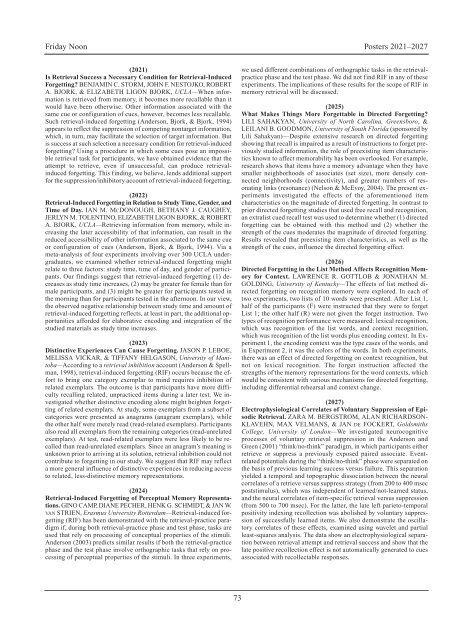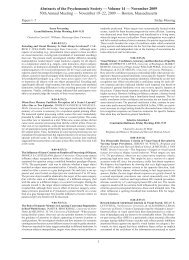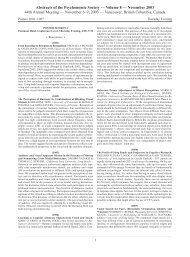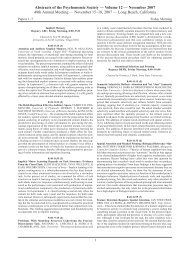Abstracts 2005 - The Psychonomic Society
Abstracts 2005 - The Psychonomic Society
Abstracts 2005 - The Psychonomic Society
You also want an ePaper? Increase the reach of your titles
YUMPU automatically turns print PDFs into web optimized ePapers that Google loves.
Friday Noon Posters 2021–2027<br />
(2021)<br />
Is Retrieval Success a Necessary Condition for Retrieval-Induced<br />
Forgetting? BENJAMIN C. STORM, JOHN F. NESTOJKO, ROBERT<br />
A. BJORK, & ELIZABETH LIGON BJORK, UCLA—When information<br />
is retrieved from memory, it becomes more recallable than it<br />
would have been otherwise. Other information associated with the<br />
same cue or configuration of cues, however, becomes less recallable.<br />
Such retrieval-induced forgetting (Anderson, Bjork, & Bjork, 1994)<br />
appears to reflect the suppression of competing nontarget information,<br />
which, in turn, may facilitate the selection of target information. But<br />
is success at such selection a necessary condition for retrieval-induced<br />
forgetting? Using a procedure in which some cues pose an impossible<br />
retrieval task for participants, we have obtained evidence that the<br />
attempt to retrieve, even if unsuccessful, can produce retrievalinduced<br />
forgetting. This finding, we believe, lends additional support<br />
for the suppression/inhibitory account of retrieval-induced forgetting.<br />
(2022)<br />
Retrieval-Induced Forgetting in Relation to Study Time, Gender, and<br />
Time of Day. IAN M. MCDONOUGH, BETHANY J. CAUGHEY,<br />
JERLYN M. TOLENTINO, ELIZABETH LIGON BJORK, & ROBERT<br />
A. BJORK, UCLA—Retrieving information from memory, while increasing<br />
the later accessibility of that information, can result in the<br />
reduced accessibility of other information associated to the same cue<br />
or configuration of cues (Anderson, Bjork, & Bjork, 1994). Via a<br />
meta-analysis of four experiments involving over 300 UCLA undergraduates,<br />
we examined whether retrieval-induced forgetting might<br />
relate to three factors: study time, time of day, and gender of participants.<br />
Our findings suggest that retrieval-induced forgetting (1) decreases<br />
as study time increases, (2) may be greater for female than for<br />
male participants, and (3) might be greater for participants tested in<br />
the morning than for participants tested in the afternoon. In our view,<br />
the observed negative relationship between study time and amount of<br />
retrieval-induced forgetting reflects, at least in part, the additional opportunities<br />
afforded for elaborative encoding and integration of the<br />
studied materials as study time increases.<br />
(2023)<br />
Distinctive Experiences Can Cause Forgetting. JASON P. LEBOE,<br />
MELISSA VICKAR, & TIFFANY HELGASON, University of Manitoba—According<br />
to a retrieval inhibition account (Anderson & Spellman,<br />
1998), retrieval-induced forgetting (RIF) occurs because the effort<br />
to bring one category exemplar to mind requires inhibition of<br />
related exemplars. <strong>The</strong> outcome is that participants have more difficulty<br />
recalling related, unpracticed items during a later test. We investigated<br />
whether distinctive encoding alone might heighten forgetting<br />
of related exemplars. At study, some exemplars from a subset of<br />
categories were presented as anagrams (anagram exemplars), while<br />
the other half were merely read (read-related exemplars). Participants<br />
also read all exemplars from the remaining categories (read-unrelated<br />
exemplars). At test, read-related exemplars were less likely to be recalled<br />
than read-unrelated exemplars. Since an anagram’s meaning is<br />
unknown prior to arriving at its solution, retrieval inhibition could not<br />
contribute to forgetting in our study. We suggest that RIF may reflect<br />
a more general influence of distinctive experiences in reducing access<br />
to related, less-distinctive memory representations.<br />
(2024)<br />
Retrieval-Induced Forgetting of Perceptual Memory Representations.<br />
GINO CAMP, DIANE PECHER, HENK G. SCHMIDT, & JAN W.<br />
VAN STRIEN, Erasmus University Rotterdam—Retrieval-induced forgetting<br />
(RIF) has been demonstrated with the retrieval-practice paradigm<br />
if, during both retrieval-practice phase and test phase, tasks are<br />
used that rely on processing of conceptual properties of the stimuli.<br />
Anderson (2003) predicts similar results if both the retrieval-practice<br />
phase and the test phase involve orthographic tasks that rely on processing<br />
of perceptual properties of the stimuli. In three experiments,<br />
73<br />
we used different combinations of orthographic tasks in the retrievalpractice<br />
phase and the test phase. We did not find RIF in any of these<br />
experiments. <strong>The</strong> implications of these results for the scope of RIF in<br />
memory retrieval will be discussed.<br />
(2025)<br />
What Makes Things More Forgettable in Directed Forgetting?<br />
LILI SAHAKYAN, University of North Carolina, Greensboro, &<br />
LEILANI B. GOODMON, University of South Florida (sponsored by<br />
Lili Sahakyan)—Despite extensive research on directed forgetting<br />
showing that recall is impaired as a result of instructions to forget previously<br />
studied information, the role of preexisting item characteristics<br />
known to affect memorability has been overlooked. For example,<br />
research shows that items have a memory advantage when they have<br />
smaller neighborhoods of associates (set size), more densely connected<br />
neighborhoods (connectivity), and greater numbers of resonating<br />
links (resonance) (Nelson & McEvoy, 2004). <strong>The</strong> present experiments<br />
investigated the effects of the aforementioned item<br />
characteristics on the magnitude of directed forgetting. In contrast to<br />
prior directed forgetting studies that used free recall and recognition,<br />
an extralist cued recall test was used to determine whether (1) directed<br />
forgetting can be obtained with this method and (2) whether the<br />
strength of the cues moderates the magnitude of directed forgetting.<br />
Results revealed that preexisting item characteristics, as well as the<br />
strength of the cues, influence the directed forgetting effect.<br />
(2026)<br />
Directed Forgetting in the List Method Affects Recognition Memory<br />
for Context. LAWRENCE R. GOTTLOB & JONATHAN M.<br />
GOLDING, University of Kentucky—<strong>The</strong> effects of list method directed<br />
forgetting on recognition memory were explored. In each of<br />
two experiments, two lists of 10 words were presented. After List 1,<br />
half of the participants (F) were instructed that they were to forget<br />
List 1; the other half (R) were not given the forget instruction. Two<br />
types of recognition performance were measured: lexical recognition,<br />
which was recognition of the list words, and context recognition,<br />
which was recognition of the list words plus encoding context. In Experiment<br />
1, the encoding context was the type cases of the words, and<br />
in Experiment 2, it was the colors of the words. In both experiments,<br />
there was an effect of directed forgetting on context recognition, but<br />
not on lexical recognition. <strong>The</strong> forget instruction affected the<br />
strengths of the memory representations for the word contexts, which<br />
would be consistent with various mechanisms for directed forgetting,<br />
including differential rehearsal and context change.<br />
(2027)<br />
Electrophysiological Correlates of Voluntary Suppression of Episodic<br />
Retrieval. ZARA M. BERGSTROM, ALAN RICHARDSON-<br />
KLAVEHN, MAX VELMANS, & JAN DE FOCKERT, Goldsmiths<br />
College, University of London—We investigated neurocognitive<br />
processes of voluntary retrieval suppression in the Anderson and<br />
Green (2001) “think/no-think” paradigm, in which participants either<br />
retrieve or suppress a previously exposed paired associate. Eventrelated<br />
potentials during the “think/no-think” phase were separated on<br />
the basis of previous learning success versus failure. This separation<br />
yielded a temporal and topographic dissociation between the neural<br />
correlates of a retrieve versus suppress strategy (from 200 to 400 msec<br />
poststimulus), which was independent of learned/not-learned status,<br />
and the neural correlates of item-specific retrieval versus suppression<br />
(from 500 to 700 msec). For the latter, the late left parieto-temporal<br />
positivity indexing recollection was abolished by voluntary suppression<br />
of successfully learned items. We also demonstrate the oscillatory<br />
correlates of these effects, examined using wavelet and partial<br />
least-squares analysis. <strong>The</strong> data show an electrophysiological separation<br />
between retrieval attempt and retrieval success and show that the<br />
late positive recollection effect is not automatically generated to cues<br />
associated with recollectable responses.





